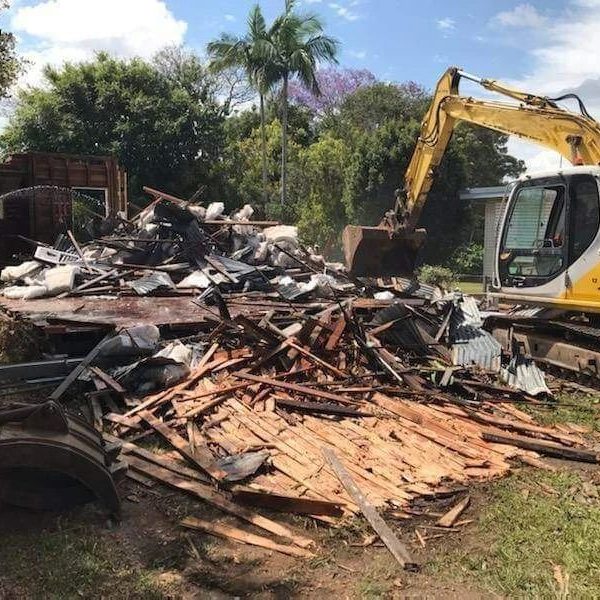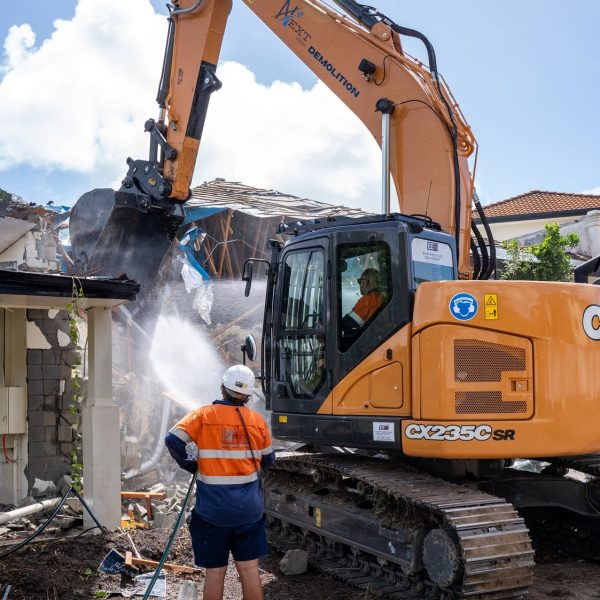These days, there’s growing traction surrounding sustainability in construction and demolition projects. Many property owners now consider whether they can recycle materials from their Gold Coast Demolition project.
Besides the environmental benefits, it also diverts large amounts of waste from the landfill. Here’s an overview of the materials that can and can’t be recycled, as well as the general recycling process during house demolition.
Common Recycled Materials in House Demolitions
Concrete and Brick
Concrete slabs, driveways, and bricks from old houses are often crushed and repurposed as aggregate for new construction projects. This process reduces landfill waste and provides a sustainable source of base material for roads and developments.
Steel and Metal
Metals such as steel beams, roofing sheets, copper wiring, and aluminium fixtures are highly recyclable. These materials can be melted down and reused in new products, making them valuable resources in a demolition project.

Timber
Salvaged timber, especially hardwood, can be repurposed for landscaping, furniture, or recycled into wood chips and mulch. On the Gold Coast, recycled timber is in demand for both residential and commercial projects due to its character and durability.
Roofing Materials
Tiles and corrugated iron roofing are usually recyclable. Tiles in good condition are resold through salvage yards, while metal roofing is recycled for use in new building materials. This prevents bulky roofing waste from filling up local landfills.
Windows and Doors
Contractors can salvage windows, doors, and frames during demolition. After undergoing refurbishment, these items are usable for renovations or can be sold through second-hand building supply stores, giving them a second life instead of being discarded.
Materials That Can’t Be Recycled
Hazardous Waste
Materials containing asbestos, lead paint, or other hazardous substances cannot be recycled due to safety concerns. These require specialist handling and licensed disposal in line with Queensland regulations.
Damaged Materials
Items that are heavily cracked, contaminated, or structurally compromised aren’t suitable for recycling. These can include rotten timber or shattered glass, as they’re unsafe and unsuitable for recycling.
Mixed Materials
Products made from combined materials, such as laminated boards, treated timber, or certain plastics, can be very difficult to separate, making them challenging to recycle. In most cases, these end up as general waste.
Recycling Process in Gold Coast Demolition Projects
Pre-Demolition Audit
Before demolition begins, contractors often carry out an audit to identify which materials can be salvaged or recycled. This helps plan the recycling process efficiently and ensures compliance with sustainability requirements.
Dismantling
Where possible, contractors carefully dismantle structures rather than knocking them down in one go. This preserves items such as windows, doors, and fixtures that can be reused, rather than damaging them during demolition.

Sorting
Recyclable materials are separated on-site into categories such as timber, metal, concrete, and general waste. Proper sorting ensures higher recycling rates and reduces contamination of recyclable streams.
Transporting
Once sorted, materials are transported to recycling facilities, salvage yards, or resale centres around the Gold Coast. Contractors often partner with local recycling depots to maximise the reuse of recovered resources.
Working With a Demolition Contractor Who Prioritises Recycling
For property owners who want a sustainable project, it’s important to work with contractors experienced in resource recovery. It’s recommended that you ask about their recycling process and how they dispose of waste to ensure a transparent process.
Local Professionals For Sustainable House Demolition in the Gold Coast Area
If you’re planning a house demolition in the Gold Coast area, you can expect to recycle materials like concrete and brick. However, you can’t recycle materials like hazardous waste and damaged materials. Usually, the recycling process involves a pre-demolition audit, dismantling structures carefully, sorting, and transporting. To hire a contractor offering recycling solutions as part of demolition, ask about their experience in resource recovery and recycling partnerships.
Next Gen Demolition is one such contractor specialising in sustainable house demolition on the Gold Coast. We integrate effective recycling strategies that include salvaging usable materials from projects. Get in touch with us to learn more.
